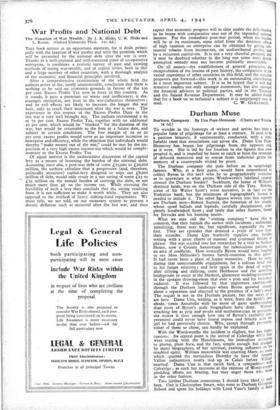War Profits and National Debt
The Taxation of War Wealth. By J. R. Hicks, U. K. Hicks and L. Rostas. (Oxford University Press. I2S. 6d.)
Tilts book arrives at an opportune moment, for it deals princi- pally with the taxation of war profits and with the problem which will be presented by the national debt after the war is over. Thanks to a well-planned and well-executed piece of co-operative enterprise, it combines a realistic survey of past and existing methods of taxing war-wealth, and of capital levies, both in this and a large number of other countries, with a thorough analysis of the economic and financial principles involved.
After a comprehensive examination of the whole field the authors arrive at the, surely unanswerable, conclusion that there is nothing to be said on economic grounds in favour of the too per cent. Excess Profits Tax now in force in this country. As it stands, it puts a premium on waste and inefficiency; it dis- courages enterprise, not least in the war-industries themselves ; and its evil effects are likely to increase the longer the war lasts, only to reach their maximum after the war is over. The experience in this respect of the Excess Profits Duty in the last war is very well brought out. The authors recommend a 6o or 7o per cent. Excess Profits Tax, together with an additional 20 per cent. which would be " blocked " for the duration of the war, but would be returnable to the firm at a future date, and subject to certain conditions. The free margin of to or zo per cent. excess profits would serve as an important incentive to enterprise and efficiency, while the objection that individuals would thereby " make money out of the war," could be met by the im- position of a very high excess income-tax which would be comple- mentary to the Excess Profits Tax.
Of equal interest is the authoritative discussion of the capital levy as a means of lessening the burden of the national debt. Assuming, inter alia, a post-war debt of some £15,000 to £20,000 million, the authors calculate that a progressive (and, therefore, politically attractive) capital-levy designed to wipe out £6,000 million of debt, would only result in a net saving of some £25 to £35 million on the annual burden of carrying the debt, or not much more than 4d. on the income tax. While stressing the feasibility of such a levy they conclude that the saving resulting from it is not sufficient to make it worth while. They are also opposed to the method of heavy sinking-fund repayments. We must rely, we are told, on our monetary system to prevent a drastic deflation such as occurred after the last war, and then
expect that economic progress will in time enable the debt-burden to be borne with comparative ease out of the expanded national income. For the immediate post-war period, when the burden will be at its maximum, some relief from the deterrent effects of high taxation on enterprise can be obtained by giving sub. stantial rebates from income-tax, on undistributed profits, and by a recurrent capital-tax. It is not a very cheerful prospect, and it may be doubted whether in the long run some more drastic attempted remedy may not become politically unavoidable.
On all counts—the establishment of general principles, the recapitulation of the lessons of past history, the comparison of the varied experience of other countries in this field, and the concrete proposals put forward—this work is an outstanding contribution to a most important subject. It is to be hoped that it will find attentive readers not only amongst economists, but also amongst the financial advisers to political parties, and in the Treasury and the Inland Revenue Department. It may be added finally that for a book on so technical a subject it is surprisingly easy to


























 Previous page
Previous page